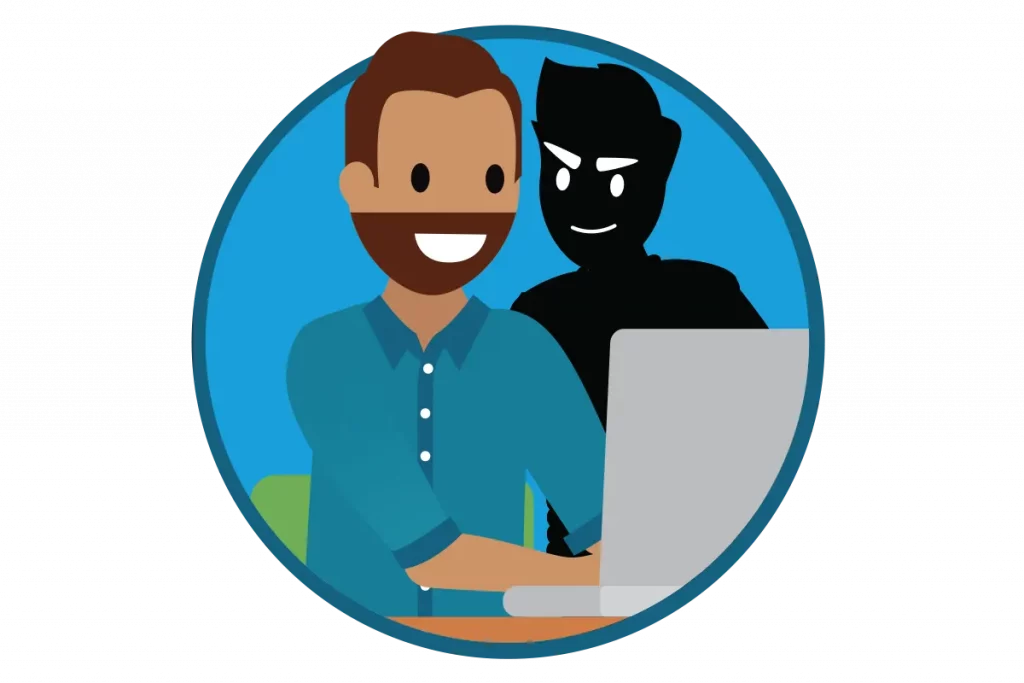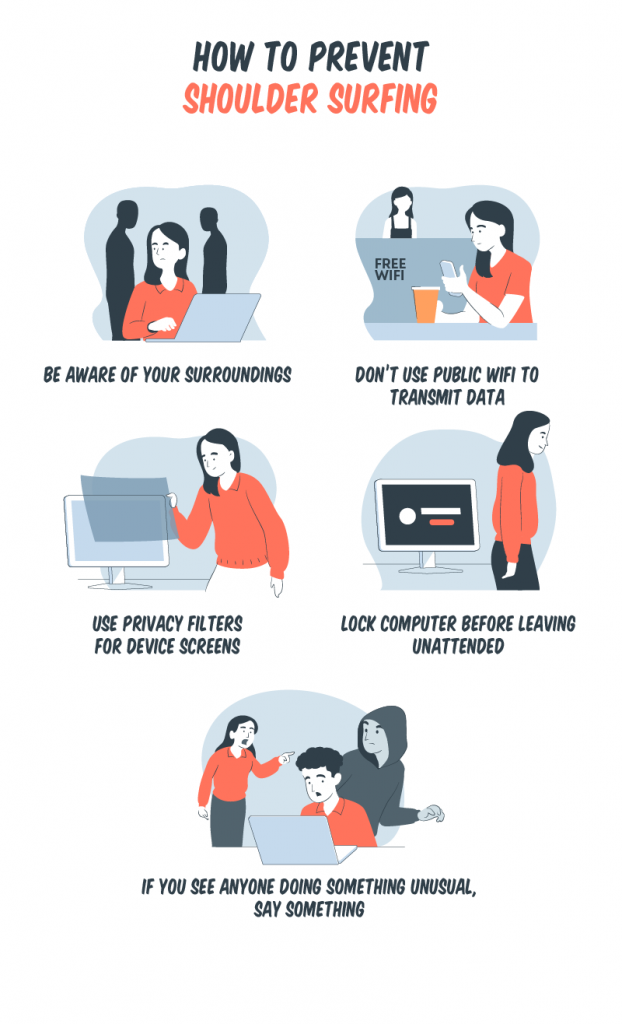 Are you aware that someone could be snooping on your digital activities and online identity without your knowledge? Yes, we are talking about shoulder surfing, a form of cybercrime where an attacker can steal sensitive information by watching over your shoulder.
Are you aware that someone could be snooping on your digital activities and online identity without your knowledge? Yes, we are talking about shoulder surfing, a form of cybercrime where an attacker can steal sensitive information by watching over your shoulder.
With the rise in technology and smart devices, this type of threat is becoming more prevalent than ever before. The good news is that there are ways to prevent it from happening to you.
In this blog post, we’ll dive into what shoulder surfing is and share some tips on how to protect yourself from these sneaky criminals in 2023!
What is shoulder surfing?
Shoulder surfing is a type of social engineering attack in which an attacker uses visual means to obtain sensitive information from their victim. This can be done by looking over the shoulder of someone who is entering their PIN at an ATM, for example.
Alternatively, an attacker may use a hidden camera to record someone typing in their password at a computer terminal.
Examples of shoulder surfing
 How is shoulder surfing accomplished? Anytime you divulge private information in a public setting, you run the risk of being the target of a shoulder surfing attack. Here are a few instances of how a shoulder surfer might try to obtain your personal data in order to access your accounts.
How is shoulder surfing accomplished? Anytime you divulge private information in a public setting, you run the risk of being the target of a shoulder surfing attack. Here are a few instances of how a shoulder surfer might try to obtain your personal data in order to access your accounts.
Accessing mobile banking
It may seem normal to log into your mobile banking while out in public, but doing so gives data thieves a chance to steal your information. Consider yourself at a neighborhood coffee shop, waiting for a coffee. You immediately access your mobile banking app and enter your username and password to check something on your bank account.
While you are typing, the person behind you can see every word because they are so near. They later access your bank account using your login information.
Use of your credit or debit card
You may become a target if you use your credit or debit card at a busy grocery shop. You could believe that all you are doing is purchasing milk and cheese. However, the individual standing next to you is secretly filming the whole transaction using a tiny recording device, from the moment you pull out your credit card to the moment you enter your PIN.
They watch the footage to make a note of your card information and PIN, then they use your credit card to steal money from a bank after that.
Logging into accounts on a laptop
It might not be as safe as you believe to use your laptop to access accounts out in the open. While you’re working from a public space, like a cafe or a library, shoulder surfing attacks can occur. As a laptop screen is often bigger than one on a mobile device, shoulder surfers have the ideal chance to gather personal data.
Without being aware of it, someone could be viewing the screen of your smartphone when you enter into your online accounts. The account information you enter could be copied by someone looking over your shoulder and used in a cyberattack.
Telephone sharing of personal information
There are various cybersecurity dangers involved with giving out personal information over the phone. When you speak out your personal information, thieves can still steal it even though there is no one watching you. Consider that your sister calls you while you’re on a crowded train and requests your Netflix login information.
You dial her up and give her your username and password without considering who might be listening. While you’re talking, someone nearby is taking down your account information and listening to the entire chat. Now that they have your login and password, they can get into your Netflix account and any other accounts you have.
How to avoid shoulder surfing

credit Everydaycyber
When you’re out in public, be aware of your surroundings and who’s around you. Shoulder surfers can be anywhere, so it’s important to always be on the lookout. Keep your personal belongings close to you and don’t let anyone get too close.
Be especially careful when using ATMs or entering your PIN into a keypad. If someone is standing too close to you or trying to look over your shoulder, cover the keypad with your hand or step away from the machine.
The consequences of shoulder surfing
Shoulder surfing is the act of looking over someone’s shoulder in order to see what they are doing or to gain information that they should not have. This can be done physically, or it can be done virtually, such as through video surveillance. Either way, shoulder surfing can have serious consequences for both the person being spied on and the person doing the spying.
Physical shoulder surfing can lead to identity theft or other crimes if the person being spied on is not careful with their personal information. They may also become a victim of harassment or stalking if the shoulder surfer is able to follow them home or get their contact information.
Virtual shoulder surfing can also lead to identity theft and other crimes, as well as privacy breaches. The person being spied on may not even know that they are being watched, which can make it very difficult to protect themselves.
The best way to avoid shoulder surfing is to be aware of your surroundings and who is around you at all times. If you think someone might be trying to spy on you, cover your hand when entering passwords or PIN numbers.
You should also never write down passwords or PIN numbers in a place where they could be easily found by someone else.
How to keep your information safe
There are a few things you can do to keep your information safe from shoulder surfers.
First, be aware of your surroundings and who is around you when you are entering sensitive information into your device.
If possible, shield the screen with your hand or body so that others cannot see what you are doing.
Second, use strong passwords or passcodes for your devices and accounts, and avoid using easily guessed words or phrases.
Finally, consider using two-factor authentication for an extra layer of security.
Use VPN to keep data safe
When you connect to a virtual private network (VPN), all of your internet traffic is routed through an encrypted tunnel. This means that anyone trying to snoop on your traffic will only see gibberish, making it much more difficult for them to steal your data.
A VPN can also help protect your privacy by hiding your real IP address from the websites you visit. This makes it harder for advertisers and other third parties to track you online.
Using a VPN is one of the best ways to keep your data safe when shoulder surfing, so make sure to connect to one whenever you’re using public Wi-Fi or sharing sensitive information online.
Best VPN to avoid Shoulder Surfing
HideIPVPN offers a VPN service with military-grade encryption, and high-speed servers with unlimited bandwidth.
Our service comes with shared IP addresses so that your activity can never be tied to one particular user, further protecting your privacy.

We also offer DNS leak protection, a Kill Switch, the latest VPN protocols, and a guaranteed no-log policy.
Best VPN Deal! Get HideIPVPN for $2.7/mo!
Every purchase you make comes with a 30-day money-back guarantee.
Conclusion
Shoulder surfing is a real threat to our security and privacy in the digital age. To protect yourself, it’s important to be aware of the signs of shoulder surfing and take steps to prevent it from happening.
This includes strategies like obscuring your view with physical barriers or using password managers that generate random passwords for each account you access.
Following these tips can help keep you safe from shoulder surfers in 2023 and beyond.



